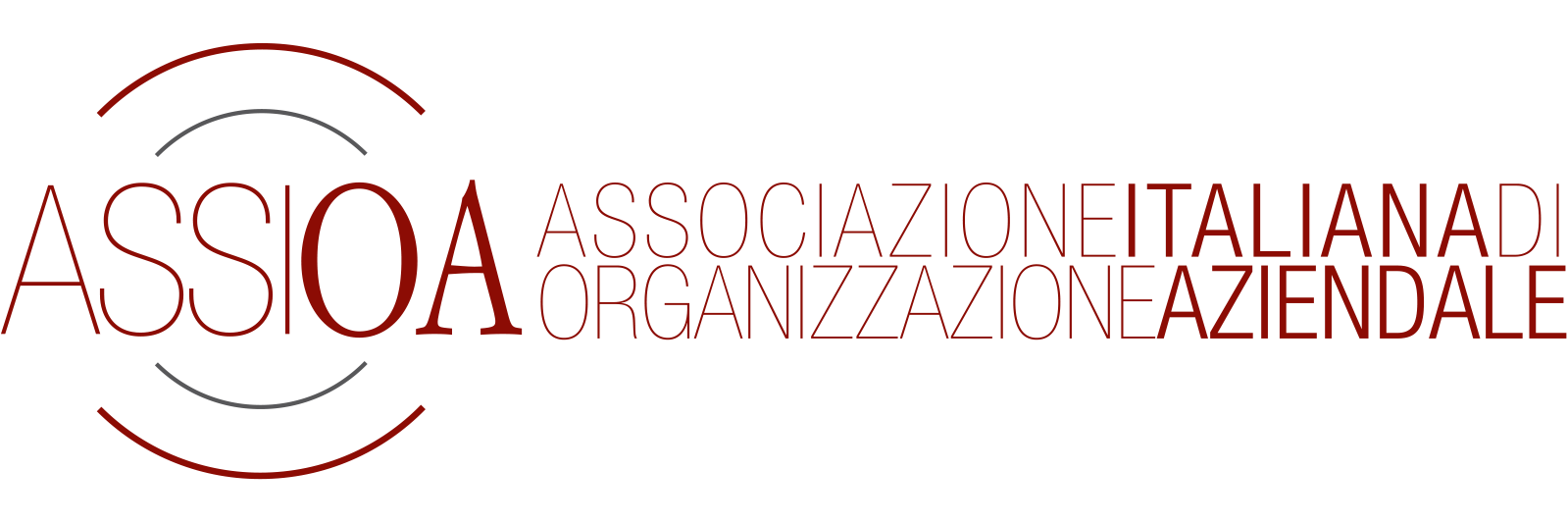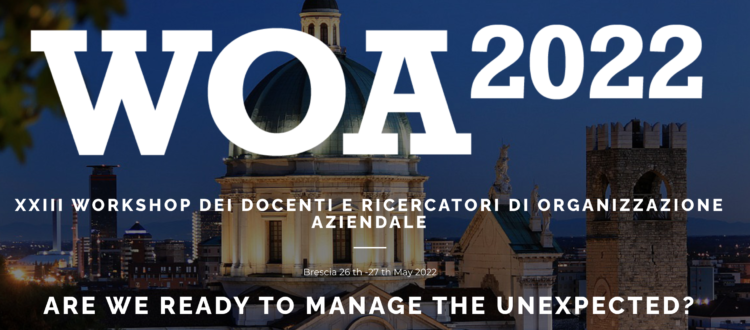WOA 2022
The SARS-COV2 pandemic has changed individual’s perception of reality in a dramatic way. People, cities, economies and countries have experienced the shock of health crisis, lockdown and the fear of unknowing. Everything has changed and we probably still do not understand the real magnitude of this change. We question ourselves about our future and the next generations’ one.
Everywhere the consciousness of the fragility has dramatically increased and we have to look for new ways to cope with it. In other words, we have to learn and increase our set of possible actions toward and reactions to “nonobvious breakdowns” (Weick & Sutcliffe, 2015).
WOA 2021 opened up this line of research by focusing on “new meanings and purposes in human action” and Professor Chia’s keynote speech was illuminating under this perspective. In his work, Professor Chia highlights how nowadays, “the organization is inextricably immersed and intertwined with its environment, and both are perpetually shifting and changing” (Chia, 2017, p. 108) and proposes to the academic community to focus on a form of learning based on practice and on sensing that allows for constant searching, adjustments, reconfiguration of responses to emergent issues. He calls this learning “wayfinding” by meaning the refining of empirical sensitivity to cope effectively with uncertainty, and to respond to external solicitations to meet the organizations changing needs.
The wayfinding approach is thus strongly related to organizational resilience, defined as “the maintenance of positive adjustment under challenging conditions such that the organization emerges from those conditions strengthened and more resourceful” (Vogus & Sutcliffe, 2007, 3418). Being resilient means having latent resources and the ability to combine them differently in order to cope with challenging and changing conditions.
The pandemic crisis acted as a Black Swan (a random event with three properties: large impact, incomputable probabilities, and surprise effect), notwithstanding several voices claim that it should not, and generated a chaotic situation all over the world. Due to the complexity and the interrelatedness of the social and economic systems, sub-systems reacted with different levels of effectiveness by influencing each other to some extent. It is time to look for the antecedents of fragility and understand how we, as a scientific community, could contribute to build antifragile organizations characterized by the ability to gain more benefits from chaos than harm (Taleb, 2012).
The psycho-sociological approaches (e.g. De Carlo, 2003) point out the mechanisms through which chaos and uncertainty generates stress on individuals and groups, and a huge body of literature (e.g. Daniels & Guppy, 1994; Sonnentag & Frese, 2013) demonstrates that caring about individual and organizational well-being (Avallone & Paplomatas, 2005) is an effective manner to prevent stress in both private and working life. Moreover, the pandemic period calls for an extension of the concept of stress and for overcoming the classical identification of occupational stressors at the workplace. It is necessary to embrace a more comprehensive approach, which should include workers physical and mental conditions, by cross-fertilising scientific domains such as management, psychology and sociology. From a people management point of view, competence and leadership models, sustainable and wellbeing oriented practices (Salas-Vallina et al., 2020), welfare policies, and new dimension of the work-life balance issue should be investigated and contextualized in the so-called “next normal” paradigm.
As far as processes and structures are concerned, we have to deal with new learning strategies, the management of distant workforce, the revision of HR tools and policies and with a different approach to job design (and the birth of new jobs) in order to account for the increase of remote working that differently shapes roles, tasks and collaborative attitudes.
Several companies had to adapt their business models to the emerging contextual situation and new sources of competitive advantage arose together with deep process reengineering, also thanks to the increasing diffusion of digital technologies.
However, the boost in digitization due to the pandemic crisis was randomly applied in several organizations, namely SMEs and public ones. The lack of planning ability clearly emerged. Schools and universities faced several challenges in implementing the distant learning processes and a profound digital divide arose. Generally speaking, the Public Administration – already involved in a slow and laborious process of digital transition – had to put in place huge organizational efforts to guarantee to citizens essential services in this turbulent times. Some authors claim for the need of a more “robust” governance and leadership in the PA (Ansell et al., 2020) based on agility and flexibility, and we should question ourselves about the evolution of managerial processes and practices in the public sector after the pandemic shock.
The pandemic also increased citizens’, customers’ and employees’ awareness about an economic sustainable development, not only in terms of eco-friendly behaviours but also in terms of labour market inequalities (e.g. social costs for the national Health Systems) and individuals’ mental and physical health.
The previous issues drive us to meditate on organizational performance indicators as companies are becoming more and more “social actors” and have to go beyond the classical concepts of performance.
It is straightforward that the complexity of these challenges would benefit from multiple perspectives approaches. The WOA 2022 thus invites participants to reflect on these and other related questions by embracing, as much as possible, different points of view and theoretical approaches by also involving and inviting colleagues form other disciplines, such as work psychology, sociology and labour law.



